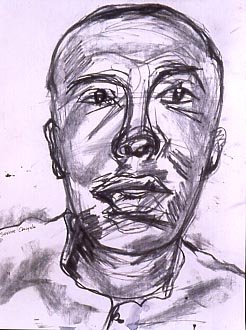|

|  |

Sowore Omoyele
2001
charcoal on paper
12" x 9"
(SOLD) Pro-Democracy Activist
Nigeria
Sowore Omoyele checked into the Bellevue-NYU Program for Torture Survivors
in 1999 to treat the lingering effects of an unknown substance
forcibly administered to him during one of his eight arrests by the
Nigeria security police. Though the 1994 incident would result in
health problems that still lingered five years later, Omoyele continues to describe each detention as a chance to "spread the
message" and "earn converts".
The message to which Omoyele has dedicated his life is the establishment
of democracy and human rights in his native country of Nigeria.
Forced to witness the rape of his cousin and the torture and
molestation of his half-brothers and their mother during a ransack of their village by
military police when he was just ten years old, Omoyele became an
outspoken voice of opposition that rose as a college freshman and
refused to be silenced. Protesting rampant corruption in the
government, and the failure of the international community,
including the United States, to see past the monetary interests
associated with Nigeria's crude oil production, Omoyele continued to
organize Nigeria's youth despite being labeled a "threat to
national security" and living under constant threat to his
safety. The military response to the peaceful protests of Omoyele
and other students was horrific brutality including executions and
"kidnappings" that involved beatings, stabbings,
tear-gassing, and one occasion in which Omoyele was shackled and
chained to the floor of a small cell for six days. This
government-sponsored violence drew international attention in 1995,
with the murder of environmental activist Ken Saro-Wiwa. Omoyele,
while in detention, was threatened with the same fate.
Vowing not to leave Nigeria until some semblance of democracy existed,
Omoyele eventually departed in 1999 to seek medical treatment,
following the election of President Abunsanjo. However, he is quick
to emphasize that basic needs such as health care and running water
continue to elude the Nigerian people, and that corruption amongst
government officials, especially concerning relationships with large
oil companies, persists despite the change in regime. Omoyele intends to return to Nigeria to continue the battle at home when he
feels he has reached the level of education and action he came to
achieve in the West. "If you want justice," he asserts,
"you have to fight for it."
All images on this site are copyright © 2008 by Tom Block Arts.
Please contact the artist for use of these images.
|

